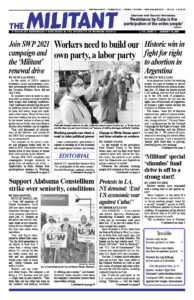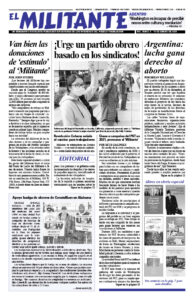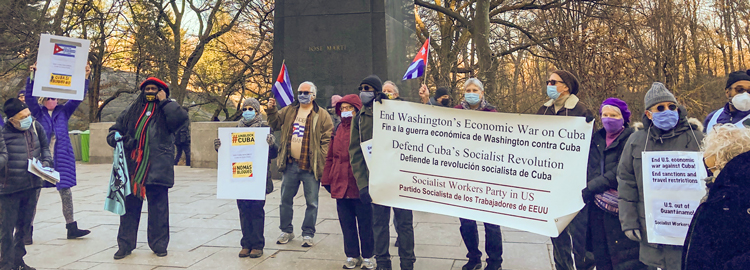LOS ANGELES — A car caravan and protest opposing Washington’s decadeslong economic war against Cuba and its revolution took place here Dec. 27 as part of a series of actions around the country.
Some 40 people in 18 cars drove from the Federal Building in West Los Angeles to Echo Park with taped signs and slogans written on their windows. The banner on the lead vehicle read, “U.S. Hands Off Cuba!” “End the Blockade!” and “U.S. Out of Guantánamo!” The caravan was sponsored by the Los Angeles U.S. Hands Off Cuba Committee.
The Dec. 27 actions, which took place here and in New York, were called by the National Network on Cuba as part of a series of protests and other activities over the next few months, including solidarity brigades to Cuba.
One 22-year-old participant in the L.A. caravan carried a hand-made sign saying, “Newsom — Call the Henry Reeve Brigade,” a reference to the brigade of volunteer doctors Cuba has organized who go wherever they’re invited around the world to help combat Ebola, coronavirus and other medical catastrophes. It also highlights the fact that California Gov. Gavin Newsom has proven incapable of halting the widespread pandemic of cases in the state.
“My son Cassio told me about this caravan to normalize relations with Cuba,” the sign carrier’s father, Antonio Mendoza, told the Militant. He was born in Cuba and works for the UNITE HERE union. “The U.S. embargo has been in existence as long as I have been alive, and it should be ended.”
The protest was covered by Telemundo/channel 52 and the Santa Monica Observer. Brenda Lopez, a leader of the committee, told Telemundo that the U.S. government should end its attacks on Cuba. She also called for medical collaboration between Washington and Cuba in fighting COVID-19.
“Before I went to Cuba, I was scared at first because they said it was dangerous, but that isn’t true,” protest participant Johanna Cervantes told Telemundo. She is a student at the University of California at Berkeley and works as an intern at a Walgreens pharmacy for eight hours a day without pay. “They don’t have a lot of resources, but Cubans are very giving. The U.S. lies.”
At the end of the caravan, Mark Friedman, a leader of the committee, told participants that the next protest against Washington’s efforts to bring down the Cuban government will be held Jan. 20 in downtown Los Angeles.
A couple dozen protesters in 10 cars took part in the caravan in New York, driving through the city and ending up at the statue of Cuban hero José Martí on Central Park South. They were festooned with banners and signs demanding an end to Washington’s embargo and for normalization of Cuba-U.S. relations. It was one of the first public actions in defense of Cuba and its revolution in many months. Participants included members of the Socialist Workers Party, Workers World Party, the Universal Zulu Nation, Venceremos Brigade and other defenders of Cuban sovereignty.
Caravan participants parked their cars decorated with signs along 59th Street and held a brief rally at the Martí statue. The Columbus Circle area where the statue is located is also a parking area for yellow cab and pedicab drivers looking for fares. Many gave protest participants a thumbs up. Ike Nahem, coordinator of the Cuba Sí Coalition, thanked everyone for coming and announced another caravan will be held Jan. 31.
In addition to ongoing monthly actions, the National Network on Cuba is projecting:
Activities to mark the 60th anniversary of two milestones in the Cuban Revolution — the decisive defeat of the U.S.-backed mercenary invasion at Playa Gíron (Bay of Pigs) April 19, 1961, and the beginning of the national literacy campaign. Hundreds of thousands of Cuban youth mobilized to spread across the island and wipe out illiteracy, which greatly strengthened the revolution.
Building the May Day Brigade to Cuba, sponsored by the Cuban Institute for Friendship with the Peoples. It’s an invaluable opportunity to learn about the revolution firsthand.
Protests and other activities on May 21, when the U.N. General Assembly will debate and vote on a resolution demanding the U.S. government end its brutal economic embargo against Cuba.
For more information, contact NNOC20012002@yahoo.com.
Róger Calero from New York contributed to this article.


